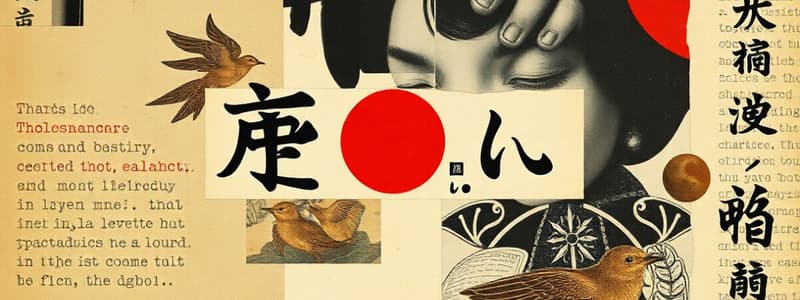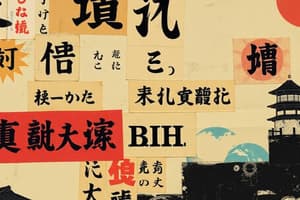Podcast
Questions and Answers
What is the correct Japanese term for 'notebook'?
What is the correct Japanese term for 'notebook'?
- enpitsu
- no-to (correct)
- kaban
- hon
Which word refers to 'granddaughter' in Japanese?
Which word refers to 'granddaughter' in Japanese?
- mago
- musume
- magomusume (correct)
- sobo
How do you say 'doctor' in Japanese?
How do you say 'doctor' in Japanese?
- isha (correct)
- shokogyu
- bengoshi
- noka
Which of the following translates to 'bus' in Japanese?
Which of the following translates to 'bus' in Japanese?
What is the Japanese word for 'family'?
What is the Japanese word for 'family'?
Which Japanese term refers to a 'mobile phone' or 'cellphone'?
Which Japanese term refers to a 'mobile phone' or 'cellphone'?
What is the Japanese word for 'chair'?
What is the Japanese word for 'chair'?
Which of the following translates to 'scissors' in Japanese?
Which of the following translates to 'scissors' in Japanese?
What is the term for 'father' in Japanese?
What is the term for 'father' in Japanese?
Which term refers to 'throat' in Japanese?
Which term refers to 'throat' in Japanese?
Flashcards are hidden until you start studying
Study Notes
Vocabulary Related to Places and Objects
- Toilet/Restroom: "toire" denotes a facility for sanitation.
- Room: "heya" signifies an enclosed area within a building.
- Library: "toshokan" is a place where books and other media are stored and made available for reading.
- Building: "tatemono" refers to a structure with a roof and walls.
- School: "gakkou" indicates an institution for educating children.
- Shoes: "kutsu" are protective footwear.
- University: "daigaku" is an institution for higher education.
- Bus: "basu" refers to a large vehicle for public transportation.
- Classroom: "kyoushitsu" is a room where instruction occurs.
- House: "uchi" indicates a place of residence.
- Canteen: "shokudou" is a dining area within an institution.
- Book: "hon" represents a written or printed work.
- Notebook: "no-to" refers to a book for writing notes.
- Pencil: "enpitsu" is a tool for mechanical writing.
- Ballpen: "bo-rupen" is a type of pen that uses a ballpoint.
- Umbrella: "kasa" is a device used for protection against rain.
- Homework: "shukudai" denotes assignments for students to complete outside school.
- Bag: "kaban" represents a container for carrying personal items.
- Paper: "kami" is a material made from cellulose fibers.
- Scissors: "hasami" are a tool used for cutting.
- Computer: "konpyu-ta" denotes an electronic device for processing data.
- Chair: "isu" refers to a piece of furniture for sitting.
- Eraser: "keshi-gomu" is a tool for removing pencil markings.
- Table: "te-buru" is a flat surface supported by legs.
- Door: "doa" is a movable barrier used to open and close an entrance.
- Window: "mado" refers to an opening in a wall, typically covered with glass.
Vocabulary Related to People and Family
- Friend: "tomodachi" denotes a person with whom one has a bond of mutual affection.
- Son: "musuko" refers to a male child in relation to his parents.
- Boyfriend: "boyifurendo" indicates a male partner in a romantic relationship.
- Daughter: "musume" refers to a female child in relation to her parents.
- Girlfriend: "garufurendo" signifies a female partner in a romantic relationship.
- Cousin: "itoko" is a relative with which one shares a common ancestor.
- Family: "kazoku" refers to a group of individuals related by blood or marriage.
- Grandfather: "sofu" denotes the father of one’s parent.
- Father: "chichi" refers to a male parent.
- Grandmother: "sobo" represents the mother of one’s parent.
- Mother: "haha" signifies a female parent.
- Grandson: "mago" denotes the son of one's child.
- Brother: "kyodai" refers to a male sibling.
- Sister: "imoto" indicates a female sibling.
- Granddaughter: "magomusume" represents the daughter of one's child.
- Husband: "otto" refers to a male partner in a marital relationship.
- Wife: "tsuma" signifies a female partner in a marital relationship.
Vocabulary Related to Body Parts
- Nose: "hana" refers to the organ for smelling.
- Mouth: "kuchi" signifies the opening through which one eats or speaks.
- Head: "atama" is the top part of the body where the brain is located.
- Throat: "nodo" denotes the passage that leads to the stomach.
- Eye(s): "me" signifies the organ of sight.
- Arm: "ude" is a limb of the human body used for manipulation.
- Hand: "te" refers to the end part of the arm.
- Eyebrows: "mayuge" are the strips of hair above the eyes.
- Stomach: "onaka" indicates the part of the body for digestion.
- Ear: "mimi" refers to the organ used for hearing.
- Leg: "ashi" denotes a limb used for standing and walking.
- Body: "karada" refers to the physical structure of a person.
Vocabulary Related to Personal Information
- Occupation: "shokugyou" refers to one's job or profession.
- Name: "namae" signifies a designation for a person.
- Address: "juusho" indicates the location of a person's residence.
- Birthday: "tanjobi" refers to the date of a person's birth.
- Age: "nenrei" signifies how many years someone has lived.
- Pronouns include:
- I: "watashi"
- They: "karera"
- We: "watashitachi(wa)"
- It: "sore"
- He: "kare"
- She: "kanojo"
- You (2nd person): "anata tachi"
- You (3rd person): "ano hito"
Vocabulary Related to Places and Objects
- Toilet/Restroom: "toire" denotes a facility for sanitation.
- Room: "heya" signifies an enclosed area within a building.
- Library: "toshokan" is a place where books and other media are stored and made available for reading.
- Building: "tatemono" refers to a structure with a roof and walls.
- School: "gakkou" indicates an institution for educating children.
- Shoes: "kutsu" are protective footwear.
- University: "daigaku" is an institution for higher education.
- Bus: "basu" refers to a large vehicle for public transportation.
- Classroom: "kyoushitsu" is a room where instruction occurs.
- House: "uchi" indicates a place of residence.
- Canteen: "shokudou" is a dining area within an institution.
- Book: "hon" represents a written or printed work.
- Notebook: "no-to" refers to a book for writing notes.
- Pencil: "enpitsu" is a tool for mechanical writing.
- Ballpen: "bo-rupen" is a type of pen that uses a ballpoint.
- Umbrella: "kasa" is a device used for protection against rain.
- Homework: "shukudai" denotes assignments for students to complete outside school.
- Bag: "kaban" represents a container for carrying personal items.
- Paper: "kami" is a material made from cellulose fibers.
- Scissors: "hasami" are a tool used for cutting.
- Computer: "konpyu-ta" denotes an electronic device for processing data.
- Chair: "isu" refers to a piece of furniture for sitting.
- Eraser: "keshi-gomu" is a tool for removing pencil markings.
- Table: "te-buru" is a flat surface supported by legs.
- Door: "doa" is a movable barrier used to open and close an entrance.
- Window: "mado" refers to an opening in a wall, typically covered with glass.
Vocabulary Related to People and Family
- Friend: "tomodachi" denotes a person with whom one has a bond of mutual affection.
- Son: "musuko" refers to a male child in relation to his parents.
- Boyfriend: "boyifurendo" indicates a male partner in a romantic relationship.
- Daughter: "musume" refers to a female child in relation to her parents.
- Girlfriend: "garufurendo" signifies a female partner in a romantic relationship.
- Cousin: "itoko" is a relative with which one shares a common ancestor.
- Family: "kazoku" refers to a group of individuals related by blood or marriage.
- Grandfather: "sofu" denotes the father of one’s parent.
- Father: "chichi" refers to a male parent.
- Grandmother: "sobo" represents the mother of one’s parent.
- Mother: "haha" signifies a female parent.
- Grandson: "mago" denotes the son of one's child.
- Brother: "kyodai" refers to a male sibling.
- Sister: "imoto" indicates a female sibling.
- Granddaughter: "magomusume" represents the daughter of one's child.
- Husband: "otto" refers to a male partner in a marital relationship.
- Wife: "tsuma" signifies a female partner in a marital relationship.
Vocabulary Related to Body Parts
- Nose: "hana" refers to the organ for smelling.
- Mouth: "kuchi" signifies the opening through which one eats or speaks.
- Head: "atama" is the top part of the body where the brain is located.
- Throat: "nodo" denotes the passage that leads to the stomach.
- Eye(s): "me" signifies the organ of sight.
- Arm: "ude" is a limb of the human body used for manipulation.
- Hand: "te" refers to the end part of the arm.
- Eyebrows: "mayuge" are the strips of hair above the eyes.
- Stomach: "onaka" indicates the part of the body for digestion.
- Ear: "mimi" refers to the organ used for hearing.
- Leg: "ashi" denotes a limb used for standing and walking.
- Body: "karada" refers to the physical structure of a person.
Vocabulary Related to Personal Information
- Occupation: "shokugyou" refers to one's job or profession.
- Name: "namae" signifies a designation for a person.
- Address: "juusho" indicates the location of a person's residence.
- Birthday: "tanjobi" refers to the date of a person's birth.
- Age: "nenrei" signifies how many years someone has lived.
- Pronouns include:
- I: "watashi"
- They: "karera"
- We: "watashitachi(wa)"
- It: "sore"
- He: "kare"
- She: "kanojo"
- You (2nd person): "anata tachi"
- You (3rd person): "ano hito"
Studying That Suits You
Use AI to generate personalized quizzes and flashcards to suit your learning preferences.




